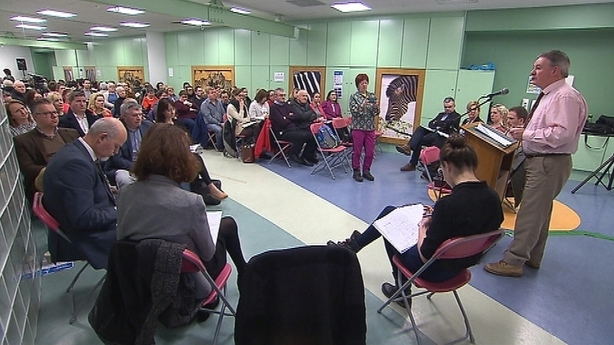A coalition of organisations working in the disability sector has met general election candidates in constituencies around the country to appeal for more money to avert what they're describing as a funding crisis within the sector.
They say they need at least another €20 million per year between them.
The Disability Action Coalition represents Acquired Brain Injury Ireland, Cheshire Ireland, Chime, Enable Ireland, Headway Ireland, Irish Wheelchair Association, Multiple Sclerosis Ireland, National Council for the Blind in Ireland and the Rehab Group.
The coalition says its member organisations are in a funding crisis and its services are under threat.
It claims they're not being fully funded for the services they provide, not getting the full cost of pay restoration for staff and are being required to fund the growth in regulation and compliance and meet the huge increase in insurance costs, without additional resources.
We need your consent to load this rte-player contentWe use rte-player to manage extra content that can set cookies on your device and collect data about your activity. Please review their details and accept them to load the content.Manage Preferences
Read more:
Election 2020: Views from the coffee run
Women's rights 'need more election prominence' - Coppinger
The coalition says organisations are going into deficit as a result, and they're being forced to bridge gaps in their funding from their own resources.
The Disability Action Coalition says its research shows that it will cost at least €20m to address the funding shortfall among member organisations.
The coalition organised what it described as a day of action today, to brief general election candidates in constituencies around the country.

Among those briefing politicians in Cork was 36-year old Padraig Hanafin, from Ballyferriter in County Kerry. Padriag has been a wheelchair user for the past 21 years, since he suffered a spinal injury in an accident.
adriag spoke on behalf of tens of thousands of people who use the services of disability support organisations. He said the shortfall in funding for these organisations affects each of those people individually.
"It affects people in their day-to-day lives, trying to live independently, trying to live at home, trying to get out to work, trying to get out to education," Padraig says.
"These cuts have severely impacted these people. That is why the Disability Action Coalition is trying to find the €20 million funding, to keep the organisations that are filling the vacuum that the Government is creating, to try to keep them going without creating a deficit."
Eugene Higgins is Assistant Area Manager of Rehab Group's National Learning Network. He was at the network's Hollyhill base in Cork to brief politicians today too.
His message to politicians was direct: "Don't forget us. Don't promise us. Deliver," he urged them. "Don't forget people with disability and all the organisations that are supporting them to get them back into work, get them educated and give them independent living."
The Disability Action Coalition organised briefing sessions for general election candidates in Dublin, Mayo, Offaly and in County Tipperary, as well as in Cork.
In Castlebar, County Mayo, Enable Ireland Chief Executive John O'Sullivan briefed politicians there.
"The sector is in crisis," he told the candidates. "We have been suffering cuts to our budgets for the last 10 years or more, and agencies are now in absolute crisis and have massive deficits. They're at risk of going out of business."
Priscilla Hristova is from Claremorris in County Mayo. Priscilla's son has used Enable Ireland's services in Castlebar for the past six years. She spoke to politicians about her son at today's briefing too.
"He's now six and he has started primary school. We are transferring out of these services, which have been amazing.
Without them, he wouldn't be able to stand up and take two steps the way he can at the moment," Priscilla said.
But she added: "Over the last year there have been huge cutbacks."
In a statement this evening, the HSE said it had allocated €2 billion to disability services for this year.
A spokeswoman said that, among other services, that funding would provide 8,358 residential places; it would provide adult day services and supports for in excess of 23,000 adults with physical and sensory disabilities, intellectual disability and autism in over 950 service locations throughout the country.
She said the money would also be used to identify approximately 1,600 young people due to leave school or rehabilitative training and provide approximately 1,200 new placements during the year to meet their needs.
The spokeswoman said the HSE acknowledges the operational and service challenges in meeting need whilst at the same time ensuring that services are delivered within a defined budget.
She promised that the HSE would continue to work in partnership with all service provider organisations to ensure the best level of service possible is provided to people with a disability, and their families, within the resources available.







